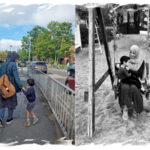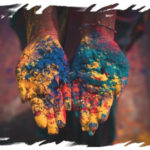It was a groundbreaking sound. Something different from anything I heard before. It shattered my mind. For more than an hour, I did not know what I was doing. My bones were shaking. My unconscious screams were mixed with hysterical crying. Probably by reflex from previous explosions, I called my parents to tell them I survived whatever just happened and I started checking on relatives and friends. One month later, I still had not checked on everyone. How can you check on the inhabitants of a whole city? Beirut, the vibrant capital of Lebanon, was destroyed by the largest non-military explosion in history and once again, Lebanese would have to rise from ashes like the Phoenix. This Phoenix myth has become a curse. You cannot, and you should not rise from ashes as if this was the national sport.
During its five-thousand-year history, Beirut has been destroyed and rebuilt seven times. I used to say this very proudly to friends visiting from abroad when walking with them around the Martyr’s Square. Now I cannot stop sobbing at the idea that we have to go through this cycle of destruction and rebuilding for yet another time.
As I was roaming in the streets of Gemmayzeh and Mar Mekhayel around Beirut Port five days after the explosion, my heart was clenching so hard that I was feeling breathless. Destruction is ten times more fatal than what you see in pictures or videos. The restaurants, pubs, shops and art galleries where I spent happy, careless moments of conviviality and learning were all destroyed. The buildings that had always felt like home were all on the ground. Nothing was or will be the same again.
Having grown up through fifteen years of a harsh civil war, I have learned that destruction does not ever come alone. It is the inevitable ally of pain and suffering; the pains and sufferings of those who lose a loved one; of those who never recover from psychological or physical injuries; of those who can never resume life as it was before; of those whose dreams are buried under the rubble. The Beirut Blast killed 191 innocent people; injured 6,500, left 300,000 homeless, and caused the total or partial destruction of 10,000 buildings. The pain is unbearable, and the sufferings are unimaginable, and they do not compare to anything we went through before. Why? Because it feels like someone very evil has done it to us. In wars, it is not personal. You are a victim by coincidence. Even in assassinations, it is not you personally who is targeted. In this blast, we know the names, faces and addresses of the perpetrators. They have been relentlessly creating ways to drain our blood and suck the energy from the country. These are the warlords who, instead of being judged and persecuted when the war was over, formed the most corrupted ruling class, a country can be cursed with.
This ruling class has managed to deepen religious and confessional affiliations and maximize fear of other religious and confessional affiliations while mismanaging the country’s resources and avoiding any accountability. This is what explains that 2,750 tons of nitrate of ammonium have been stored at Beirut Port since 2013, and no one felt any urgency to take any action. This is also what explains that Lebanon was on the verge of economic and financial collapse even before the Beirut Blast.
Add to this the COVID-19 challenges, and Lebanese citizens were already struggling to make a living and to stay alive. 380,000 are currently waiting for the approval of their immigration requests. How can a population better express that it feels hopeless and helpless?
However, what is clear is that only one thing can reverse this trend and restore hope: Holding these politicians accountable for what they have committed and seeing some big heads behind prison bars, or being executed in public squares. Lebanese of today and tomorrow, and others in the world, should realize that Justice will prevail and that one cannot get away with destroying a city and the lives of its people; pains and sufferings are redemptive, and the future will only be better.



